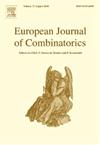A generalization of the Erdős-Birch theorem
IF 0.9
3区 数学
Q1 MATHEMATICS
引用次数: 0
Abstract
Let denote the set of all nonnegative integers. A set of positive integers is called complete if every sufficiently large integer is the sum of distinct integers taken from . In 1959, Birch confirmed a conjecture of Erdős by proving that the set is complete if are integers with . In this paper, the following result is proved: if are integers, then the set is complete if and only if .
Erdős-Birch定理的推广
设N0表示所有非负整数的集合。如果每一个足够大的整数都是取自T的不同整数的和,则称为正整数集T是完全的。1959年,Birch证实了Erdős的一个猜想:如果s1,s2>;1是gcd(s1,s2)=1的整数,则证明集{s1x1s2x2:x1,x2∈N0}是完全的。本文证明了以下结果:若s1,…,sk>;1是整数,则集{s1x1⋯skxk:x1,…,xk∈N0}是完备的当且仅当gcd(s1,…,sk)≤2。
本文章由计算机程序翻译,如有差异,请以英文原文为准。
求助全文
约1分钟内获得全文
求助全文
来源期刊
CiteScore
2.10
自引率
10.00%
发文量
124
审稿时长
4-8 weeks
期刊介绍:
The European Journal of Combinatorics is a high standard, international, bimonthly journal of pure mathematics, specializing in theories arising from combinatorial problems. The journal is primarily open to papers dealing with mathematical structures within combinatorics and/or establishing direct links between combinatorics and other branches of mathematics and the theories of computing. The journal includes full-length research papers on important topics.

 求助内容:
求助内容: 应助结果提醒方式:
应助结果提醒方式:


